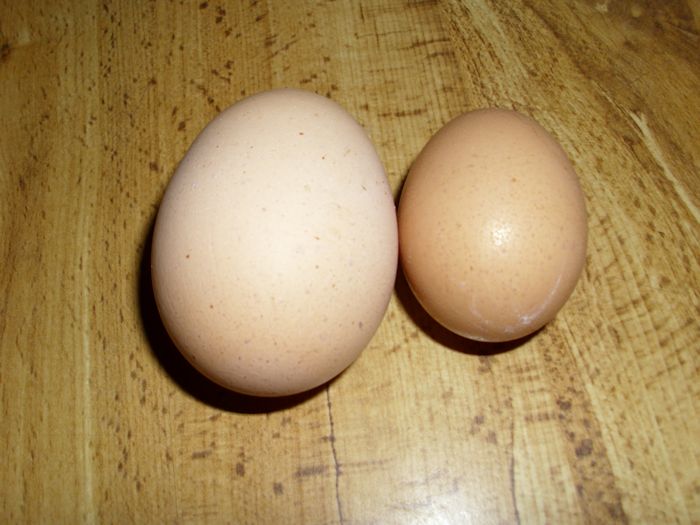You may have wondered what happened to the laying hens that I talked about in Sunday Surprise! They have grown up and have become pullets. Of course, the question now is what a pullet is and why you should want to know about it. A pullet is a young chicken. Think about it as a teenager—not quite a chick anymore, but also not an adult. A pullet is a chicken that is just starting to experience life and still has more growing to do before becoming a full-fledged chicken.
A female chick becomes a pullet when she lays her first egg. She remains a pullet until she is fully grown, which is usually after her first complete moult after she starts laying eggs. The first egg is a lot smaller than a regular egg. Our chickens will lay large to jumbo eggs. However, the pullet eggs are only about half that size as shown here.
On the left is a large egg from Violet, our Black Australorp. On the right is a pullet egg from Rose, our Delaware. Rose’s eggs will stay the color you see here—an extremely pleasing dark brown. The actual egg looks a bit polka-dotted, which is a characteristic of Delaware eggs. As Rose matures, her eggs will become larger. In fact, her eggs will eventually become larger than the ones that Violet lays.
Now, here’s why you want to know about pullets. Pullet eggs often sell for considerably less at farmer’s markets. In fact, a local farmer sells them for as little as $0.60 a dozen, which is considerably less than the $1.75 a dozen we pay for a dozen factory-produced jumbo eggs in the store (cage free eggs sell for almost $4.00 a dozen and pasture-fed eggs aren’t even available). You never see pullet eggs sold in stores because people think they’re simply too small to eat or that there is possibly something wrong with them.
You do need to know that a pullet egg may not have a yolk—although, all of our pullet eggs so far have had a yolk in them. There is absolutely no difference in taste. However, because pullet eggs always come from a farmer and are likely not from a factory environment, you may actually find that you receive a higher quality product. The statistics quoted for pasture fed chicken eggs, the kind you’ll most likely encounter at a farmer’s market, do differ, but most experts agree that they are better for you.
Our coop has entered a new phase with the addition of pullet eggs. It won’t be long now and we’ll have full-sized eggs to meet all of our needs. The eggs will be significantly better for us than anything we could buy at the store. Now that many cities let people raise chickens, have you ever considered producing your own eggs? Let me know your thoughts at [email protected].

